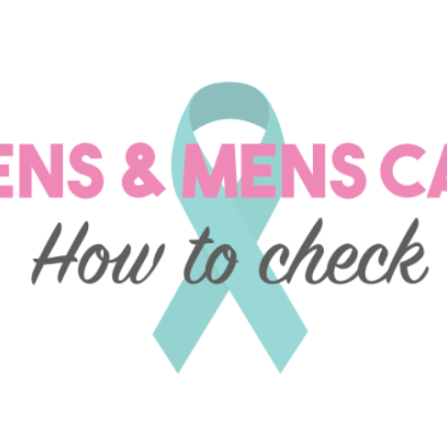According to the Irish Cancer Society, one in three people in Ireland will develop cancer during their lifetime. Around 30,000 new cases of cancer are diagnosed every year and by 2020, this number is expected to rise to over 40,000 per year. In Ireland, the five most common cancers are non melanoma skin cancer (the most common and treatable form of skin cancer), prostate cancer, breast cancer, bowel cancer and lung cancer.
There are more than 100 types of cancer but it’s heartening to know that up to 50% of all cancers can be prevented and 30% are preventable through lifestyle changes alone.
Many cancers that were once considered a death sentence can now be cured and for many more people, their cancer can be treated effectively.
Women and Cancer
Some cancers affect women only and these include cervical cancer, ovarian cancer and uterine cancer. Although breast cancer generally affects women, around 22 men develop breast cancer in Ireland each year.
Most common cancers in women
- Non melanoma skin cancer
- Breast cancer
- Bowel cancer
- Lung cancer
- Melanoma Skin
- Gynae cancers (cervical, ovary, uterine)
Men and Cancer
Certain cancers tend to be more common in men and some affect men only (prostate cancer and testicular cancer).
Most common cancers in men
- Non melanoma skin cancer
- Prostate cancer
- Bowel cancer
- Lung cancer
- Melanoma Skin
- Testicular cancer
How to get checked
Breast Cancer
The most prevalent cancer in Ireland, statistics show that one in every 11 women will be diagnosed with the disease.
Screening
Funded by the Irish government, BreastCheck provides free mammograms to women who fit the criteria every two years. The government hopes that by the end of 2021, all women aged between 50 and 69 will qualify for routine screening. BreastCheck screening was created to reduce deaths from breast cancer by finding and treating the disease at an early stage. Women are encouraged to contact BreastCheck on Freephone 1800 45 45 55 or go to www.breastcheck.ie.
Cervical Cancer
Defined as cancer of the cells lining your cervix, cervical cancer develops slowly over a number of years. Initially, abnormal changes occur in the cervix which ultimately lead to cancer itself. These abnormal cells are called CIN (cervical intraepithelial neoplasia) and are not cancerous but if left untreated could develop into cancer.
Screening
The National Cervical Screening Programme is called CervicalCheck. It provides free smear tests to women aged 25 to 60, a procedure that takes only a short amount of time and is the best way to detect changes in the cells of the cervix. A free smear test can be obtained with any nurse or doctor registered with CervicalCheck. Visit www.cervicalcheck.ie to register or call the freephone information line on 1800 45 45 55.
Ovarian Cancer
When cells in the ovary change to form a malignant tumour, this is called ovarian cancer. As it grows, the tumour can affect nearby organs such as the bowel or bladder; this can adversely affect how these organs work and symptoms can develop. Every year in Ireland, more than 300 women are diagnosed with ovarian cancer.
Screening
At the moment, no national ovarian screening programme exists in Ireland. If you have concerns, talk to your GP and be mindful that smear tests do not show up signs of ovarian cancer.
Uterine Cancer (Cancer of the womb)
Uterine cancer can affect how the womb works and develops when cells lining the womb change and form a cancer. If you’ve taken HRT for a prolonged period, are overweight, have polycystic ovaries, have never had children or have gone through the menopause, your chances of developing cancer of the womb increases. Symptoms include heavier periods, an abnormal vaginal discharge, bleeding after the menopause and bleeding between periods. Diagnosis is made through tests including dilatation and curettage (D&C), hysteroscopy, biopsy and transvaginal ultrasound. Surgery is the main treatment but chemotherapy, hormone therapy and radiotherapy can also be effective. Screening No national screening programme currently exists in Ireland. As always, if you are concerned about symptoms, pay a visit to your GP or even book a consultation with one of our doctors.
Prostate Cancer
The most common cancer in men, about 3,300 men in Ireland are diagnosed with the disease each year. Prostate cancer is an extremely treatable disease and if found early, is completely curable. Screening A rectal examination and the findings from an elevated prostate specific antigen (PSA) in the blood is the process carried out to make a diagnosis. A routine PSA screening programme is not offered in Ireland and some experts believe such a programme could result in higher numbers undergoing unnecessary treatment for slow growing prostate cancer.
Testicular cancer
Every year, 170 Irish men are diagnosed with testicular cancer. Most of these men identified with the disease will be under the age of 45. Thankfully, testicular cancer can be treated quite easily and is curable.
Screening
If your GP identifies an unusual lump, a specialist may carry out further tests such as a testicular ultrasound, blood tests and/or a CT scan.
Bowel Cancer
Approximately 1,400 cases of bowel cancer are diagnosed every year. Although women can also be affected, bowel cancer is the second most common cancer in men. There’s a lot of preventatives measures that can be taken to prevent this disease including leading a healthy lifestyle, drinking less alcohol and exercising regularly.
Screening
The national Bowel Screening Programme is called www.BowelScreen.ie. Test kits for home use are offered to people aged 60 to 69 every two years. These kits are free and look for small amounts of blood in your stool. Test kit results will not diagnose bowel cancer but may lead to further tests. Ring BowelScreen on Freephone 1800 45 45 55 to check your details are on the register.
Skin Cancer
The most common cancer in Ireland, numbers affected by skin cancer are increasing all the time. A total of 4,000 men in Ireland are diagnosed every year. It’s a disease that can, thankfully, be treated and also prevented by avoiding the sun and paying attention to your skin and looking out for any changes in the skin.
Screening
The most effective method of screening for skin cancer is getting to know your skin and ensuring you check yourself regularly, from top to toe.
Lung Cancer
This disease causes the greatest number of cancer deaths in Ireland each year. Again, like several other cancers, it can be prevented; the most important measure people can take is to stop smoking. Diagnosis A doctor’s visit is the first port of call if you’re worried about lung cancer and a chest x-ray will identify any abnormalities with your lungs.
Mouth, head and neck Cancer
Although rare, these cancers are diagnosed in around 250 men every year in Ireland. Risk factors which can increase your chance of developing these cancers include a poor diet, alcohol, smoking and sun exposure.
Diagnosis
A GP may refer you to a specialist who will inspect your mouth, throat, tongue and nose. These tests can identify these forms of cancer:
- X-ray
- Nasendoscopy
- Biopsy
- Fine needle aspiration cytology
Melanoma
An extremely common cancer in Ireland and indeed the world, melanoma is the most serious form of skin cancer and is increasing faster than any other cancer. Around 721 people are diagnoses with the disease in Ireland every year.
Screening
It’s important to become familiar with your body and be able to identify changes in your body. Check areas like your back, the sides of your arms and legs, your scalp and the soles of your feet. If you’re concerned, pay a visit to your doctor.
Cancer risk – can it be reduced?
There’s lots of conflicting advice out there on what you can do to cut your risk of cancer but there’s no doubt that the lifestyle choices you make every day can increase or decrease your chances of getting the disease. The more recommendations below you follow, the lower their risk of cancer will be.
- Don’t smoke and avoid second-hand smoke
- Be a healthy weight
- Be physically active everyday
- Have a healthy diet
- Avoid alcohol
- Avoid too much sun
- Avoid pollutants
- Get screened for cancer
Are you concerned about Cancer? You can always talk to one of our doctors anytime, from anywhere Chat to a doctor now







